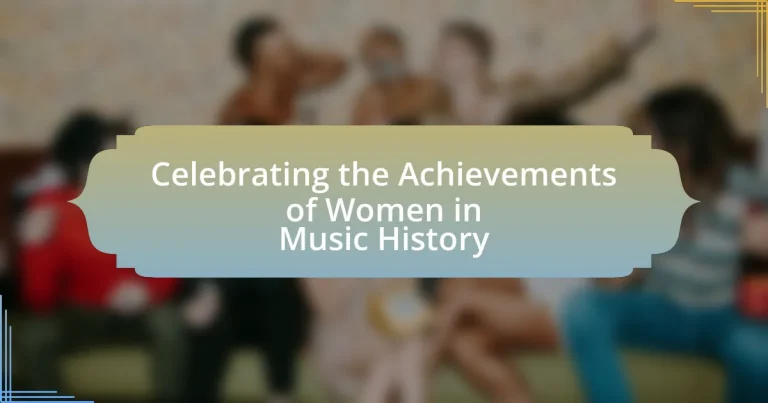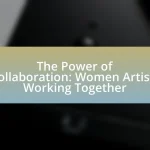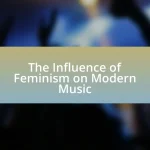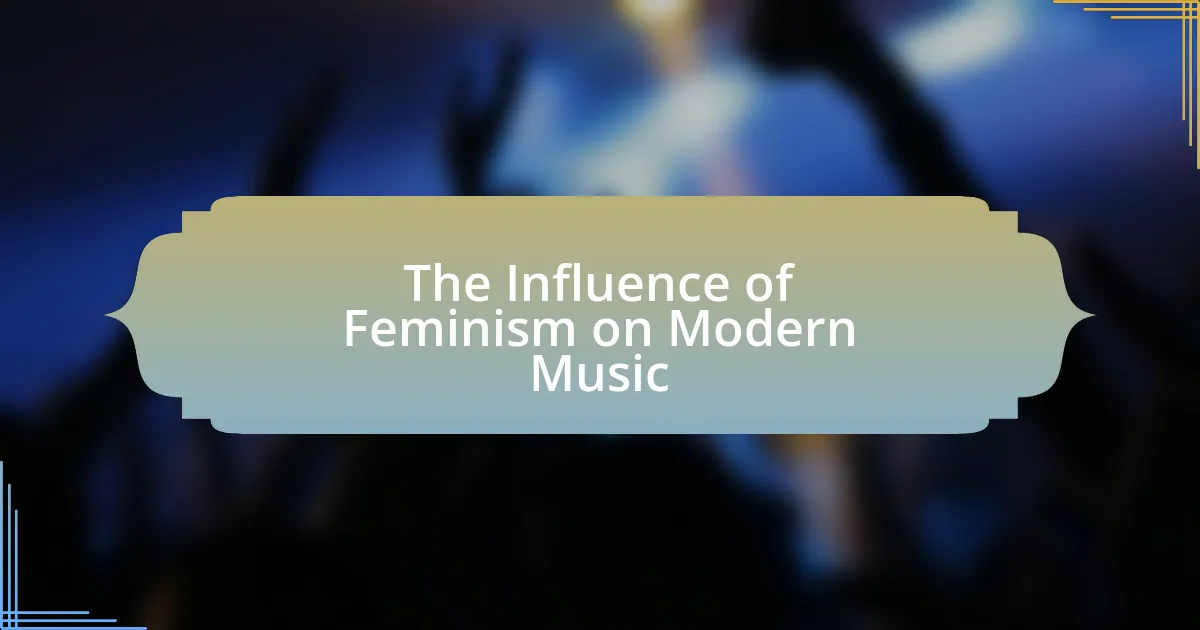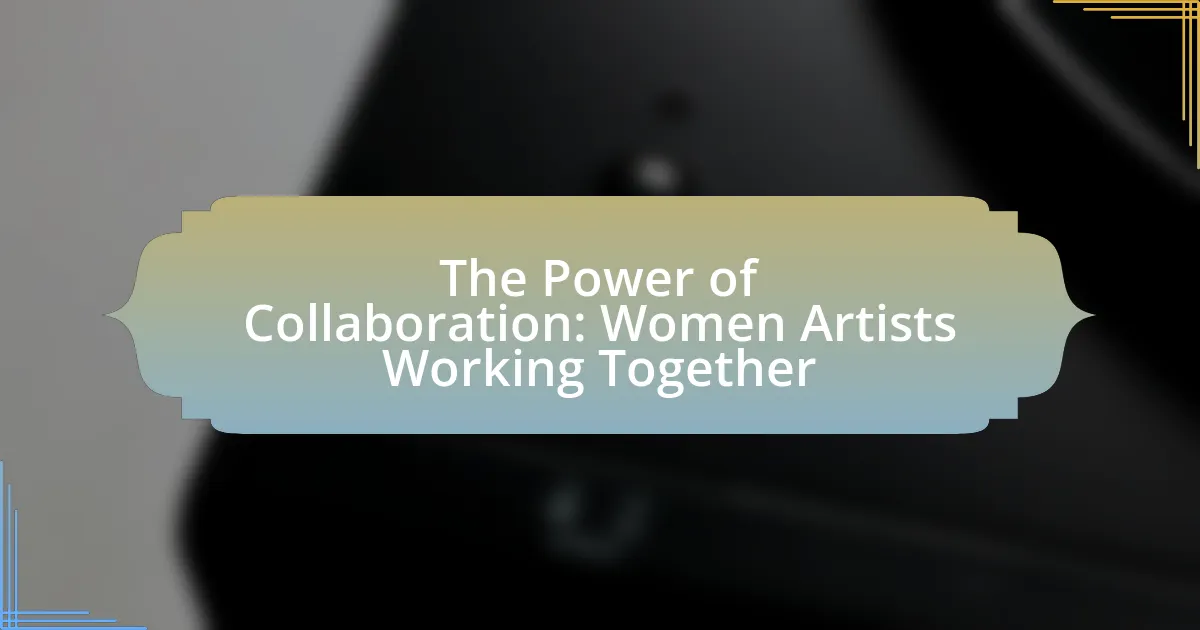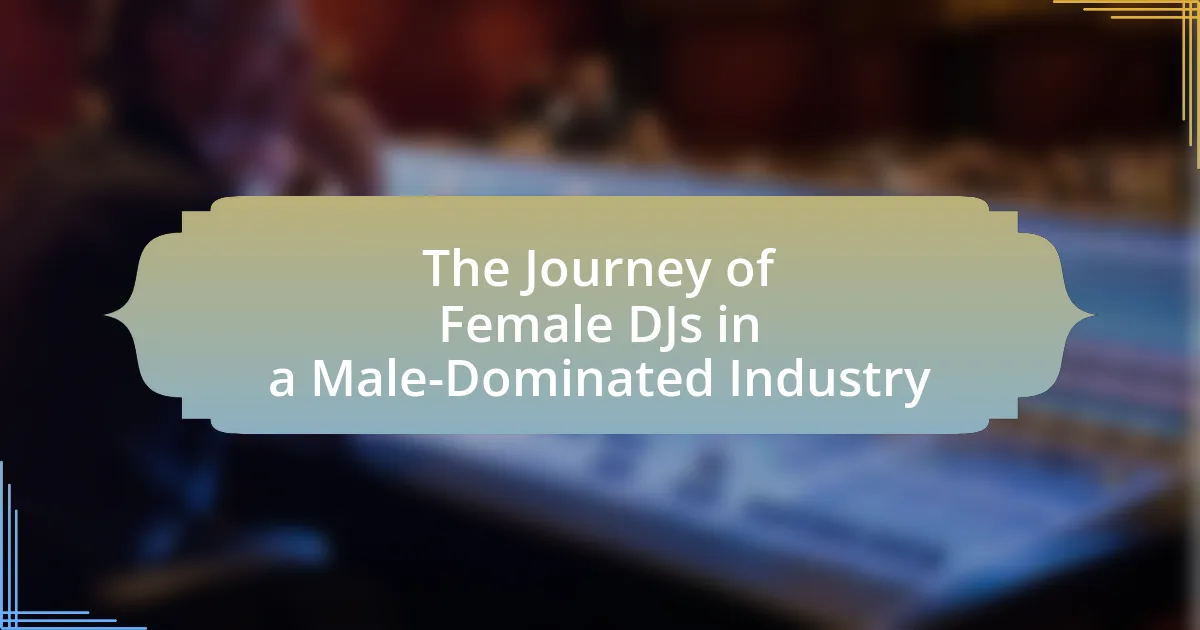The article focuses on the significant achievements of women in music history, highlighting key milestones from the emergence of female composers in the 18th and 19th centuries to contemporary artists advocating for gender equality. It explores how women have shaped various music genres, including classical, jazz, rock, and pop, while overcoming historical barriers and advocating for representation. The article also discusses notable contributions from pioneering figures and modern artists, as well as initiatives supporting women in the industry today. By recognizing these achievements, the article emphasizes the importance of celebrating women’s roles in music and the societal benefits of increased visibility and representation.
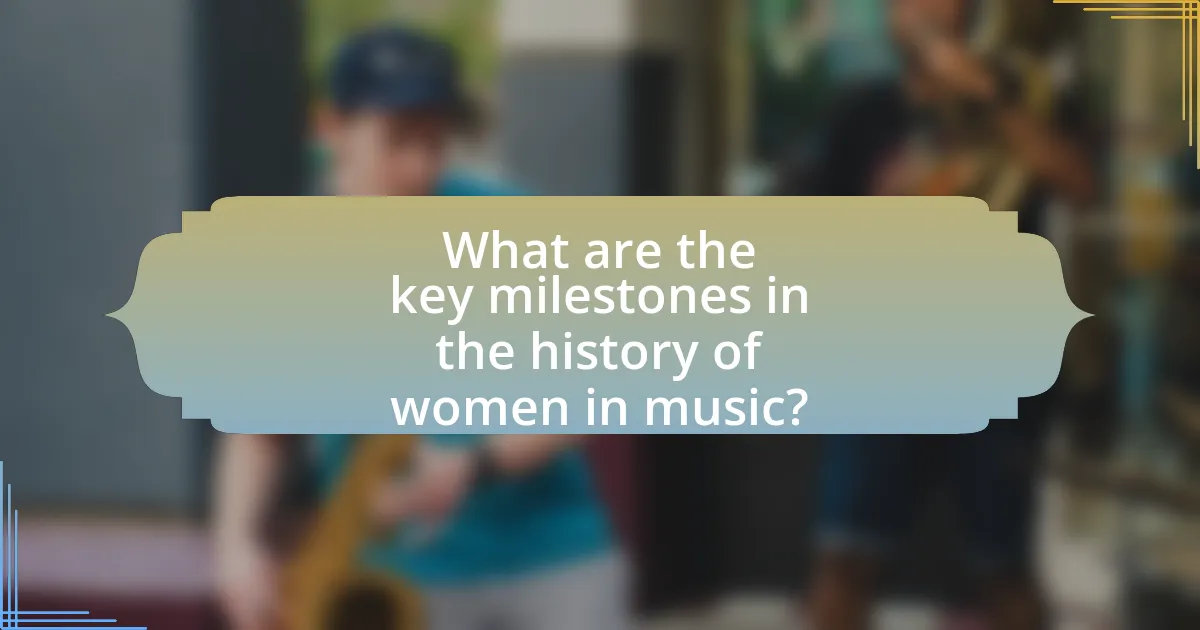
What are the key milestones in the history of women in music?
Key milestones in the history of women in music include the emergence of female composers in the 18th and 19th centuries, such as Fanny Mendelssohn and Clara Schumann, who challenged societal norms. In the 1920s, women like Bessie Smith and Billie Holiday gained prominence in jazz, paving the way for future generations. The 1960s and 1970s saw the rise of influential female rock musicians, including Janis Joplin and Joni Mitchell, who expanded the genre’s boundaries. The 1990s introduced a wave of female pop icons like Madonna and Whitney Houston, who dominated the charts and influenced culture. In recent years, artists such as Beyoncé and Taylor Swift have not only achieved commercial success but also advocated for women’s rights and representation in the industry. These milestones reflect the evolving role of women in music, showcasing their contributions and impact across various genres and eras.
How have women shaped different music genres over time?
Women have significantly shaped various music genres over time by pioneering styles, influencing trends, and breaking barriers. For instance, in jazz, artists like Billie Holiday and Ella Fitzgerald transformed vocal techniques and improvisation, setting standards for future generations. In rock music, figures such as Janis Joplin and Joan Jett challenged gender norms and inspired countless female musicians to enter the genre. Additionally, in hip-hop, artists like Queen Latifah and Missy Elliott not only showcased lyrical prowess but also addressed social issues, expanding the genre’s narrative scope. The impact of women in country music is evident through artists like Dolly Parton and Loretta Lynn, who brought attention to women’s experiences and rights through their songwriting. These contributions have not only enriched the respective genres but have also paved the way for greater representation and diversity in the music industry.
What contributions did women make to classical music?
Women made significant contributions to classical music through composition, performance, and music education. Notable female composers such as Clara Schumann and Fanny Mendelssohn created influential works that expanded the classical repertoire. Clara Schumann, for instance, composed over 60 pieces, including piano concertos and chamber music, while Fanny Mendelssohn’s works were often performed by her brother Felix, highlighting her talent despite societal constraints. Additionally, women like Nadia Boulanger played crucial roles as conductors and educators, shaping the careers of many male and female musicians in the 20th century. Their achievements have been increasingly recognized, with many of their compositions being performed and recorded in contemporary classical music.
How did women influence jazz and blues music?
Women significantly influenced jazz and blues music by shaping its sound, style, and cultural impact. Pioneering artists like Bessie Smith and Billie Holiday brought emotional depth and storytelling to blues and jazz, respectively, while also challenging societal norms. Bessie Smith, known as the “Empress of the Blues,” popularized the genre in the 1920s, selling over 780,000 copies of her recordings and influencing countless musicians. Billie Holiday’s unique vocal style and poignant lyrics transformed jazz, with songs like “Strange Fruit” addressing racial injustice, thus intertwining music with social commentary. Additionally, women such as Ella Fitzgerald and Sarah Vaughan expanded the vocal techniques and improvisational styles in jazz, earning critical acclaim and paving the way for future generations of female musicians. Their contributions not only enriched the genres but also established women as vital figures in the evolution of jazz and blues music.
What role did women play in the development of rock and pop music?
Women played a crucial role in the development of rock and pop music by serving as influential artists, songwriters, and producers. Pioneers like Sister Rosetta Tharpe blended gospel with rock, laying the groundwork for future genres. Artists such as Janis Joplin and Joan Jett challenged societal norms and expanded the boundaries of female expression in music. Additionally, songwriters like Carole King and Linda Perry crafted hits that shaped the sound of pop music, demonstrating women’s significant contributions to songwriting and production. The impact of these women is evident in the continued presence and influence of female artists in contemporary music, highlighting their foundational role in the evolution of these genres.
Why is it important to celebrate women’s achievements in music?
Celebrating women’s achievements in music is important because it acknowledges their significant contributions to the industry and promotes gender equality. Historically, women have faced barriers in the music world, yet artists like Aretha Franklin, Billie Holiday, and Beyoncé have shaped genres and influenced culture. Recognizing these achievements not only honors their legacy but also inspires future generations of female musicians. Studies show that visibility of women in music can lead to increased participation and representation, fostering a more inclusive environment in the industry.
How does recognizing women’s contributions impact future generations?
Recognizing women’s contributions in music history empowers future generations by providing role models and fostering a sense of belonging in the arts. When young women see the achievements of female musicians, such as Aretha Franklin and Billie Holiday, they are inspired to pursue their own artistic ambitions. Research indicates that representation in media and history significantly influences self-efficacy and aspirations among youth, particularly girls. For instance, a study published in the Journal of Educational Psychology found that exposure to successful female figures can enhance girls’ interest in STEM and the arts, leading to increased participation in these fields. Thus, acknowledging women’s contributions not only honors their legacy but also cultivates a more inclusive environment that encourages future generations to explore their creative potential.
What are the societal benefits of highlighting women’s roles in music?
Highlighting women’s roles in music fosters gender equality and promotes diverse representation in the arts. By showcasing female musicians, composers, and producers, society acknowledges their contributions, which can inspire future generations of women to pursue careers in music. Research indicates that increased visibility of women in music leads to greater acceptance and support for female artists, as evidenced by the rise in female-led music festivals and initiatives aimed at empowering women in the industry. Furthermore, studies show that diverse representation in music can enhance creativity and innovation, benefiting the industry as a whole.
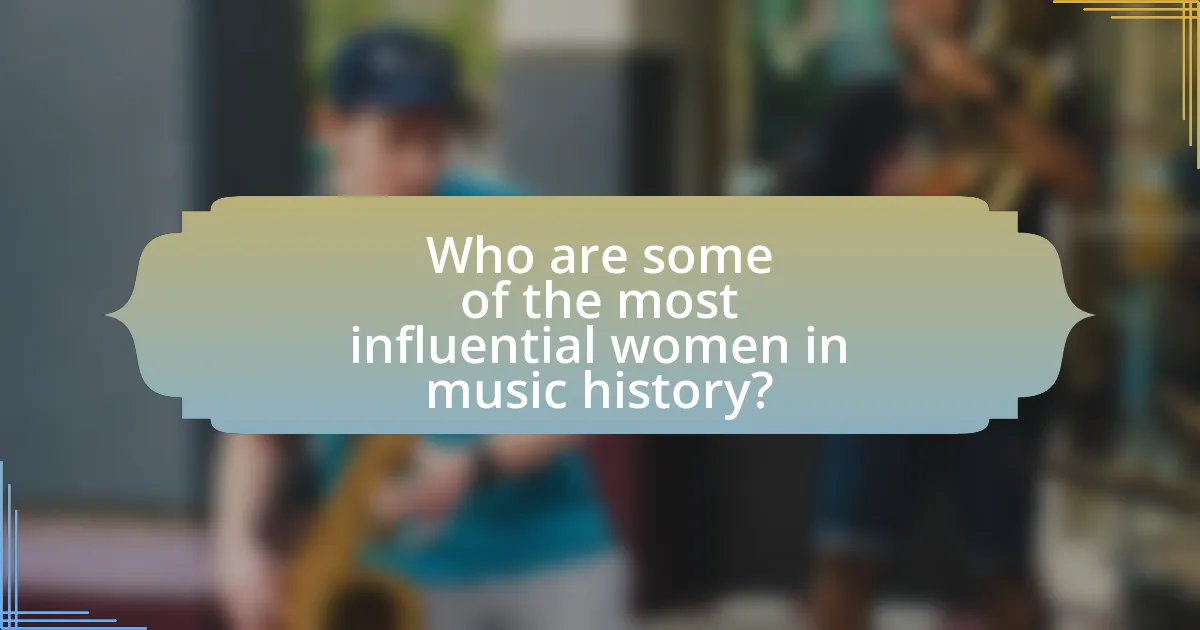
Who are some of the most influential women in music history?
Some of the most influential women in music history include Aretha Franklin, Madonna, and Billie Holiday. Aretha Franklin, known as the “Queen of Soul,” significantly impacted the music industry with her powerful voice and emotive performances, earning 18 Grammy Awards and influencing countless artists. Madonna, often referred to as the “Queen of Pop,” revolutionized the music scene with her innovative approach to music and fashion, selling over 300 million records worldwide and shaping pop culture since the 1980s. Billie Holiday, a pioneering jazz singer, transformed the genre with her unique vocal style and emotional depth, leaving a lasting legacy that continues to inspire musicians today.
What are the notable achievements of women composers and musicians?
Women composers and musicians have made significant contributions to music history, with notable achievements including the establishment of new genres, the composition of influential works, and the breaking of barriers in a male-dominated industry. For instance, Clara Schumann was a pioneering pianist and composer whose works, such as her Piano Concerto in A minor, have become staples in the classical repertoire. Additionally, Amy Beach was the first woman to compose a symphony in the United States, with her “Gaelic Symphony” premiering in 1896. Furthermore, contemporary figures like Jennifer Higdon have received prestigious awards, including the Pulitzer Prize for Music in 2010 for her work “Violin Concerto.” These achievements highlight the vital role women have played in shaping the landscape of music across various genres and eras.
Who were the pioneering women in early music history?
Pioneering women in early music history include Hildegard von Bingen, a 12th-century abbess known for her sacred compositions and visionary writings, and Francesca Caccini, the first woman to compose an opera in the early 17th century. Hildegard’s contributions to music and theology were significant, as she created a unique body of work that combined music with her mystical visions. Francesca Caccini’s opera “La liberazione di Ruggiero” premiered in 1625, marking a milestone in the history of opera and showcasing women’s capabilities in a male-dominated field. These women not only composed music but also influenced the cultural landscape of their times, establishing a legacy that paved the way for future generations of female musicians.
What modern female artists have made significant impacts in the industry?
Beyoncé, Taylor Swift, and Billie Eilish are modern female artists who have made significant impacts in the music industry. Beyoncé has redefined the role of women in music through her innovative performances and empowerment themes, exemplified by her album “Lemonade,” which received critical acclaim and multiple awards. Taylor Swift has transformed the landscape of country and pop music, becoming the first woman to win the Album of the Year Grammy three times, showcasing her influence and songwriting prowess. Billie Eilish has revolutionized pop music with her unique sound and aesthetic, winning multiple Grammy Awards, including Album of the Year for “When We All Fall Asleep, Where Do We Go?” in 2020, highlighting her impact on contemporary music.
How have women in music overcome challenges and barriers?
Women in music have overcome challenges and barriers through resilience, advocacy, and the establishment of supportive networks. Historically, women faced significant obstacles such as gender discrimination, lack of access to resources, and limited representation in the industry. For instance, artists like Aretha Franklin and Joan Baez broke through these barriers by asserting their artistic identities and demanding equal opportunities. Additionally, the rise of organizations like Women in Music has provided platforms for mentorship and professional development, empowering women to navigate the industry more effectively. Statistics show that female artists are increasingly gaining visibility, with women making up 22% of artists on the Billboard Hot 100 in 2020, a significant increase from previous decades. This progress illustrates how women in music have not only confronted challenges but have also reshaped the landscape of the industry.
What obstacles have women faced in the music industry historically?
Women in the music industry have historically faced significant obstacles, including systemic sexism, lack of access to opportunities, and gender discrimination. For instance, women were often relegated to roles as performers rather than songwriters or producers, limiting their creative control and financial independence. According to a study by the Annenberg Inclusion Initiative, only 12.3% of producers across popular music were women from 2012 to 2019, highlighting the gender disparity in key industry roles. Additionally, women have frequently encountered harassment and a hostile work environment, which has further hindered their career advancement. These challenges have contributed to a historical underrepresentation of women in influential positions within the music industry.
How have women advocated for equality and representation in music?
Women have advocated for equality and representation in music through various movements, initiatives, and their own artistic expressions. For instance, the establishment of organizations like the Women’s Audio Mission in 2003 has focused on empowering women in audio and music production, providing training and resources to increase female representation in technical roles. Additionally, artists such as Beyoncé and Taylor Swift have used their platforms to address gender inequality, with Beyoncé’s “Flawless” promoting feminist ideals and Swift’s advocacy for artists’ rights highlighting systemic issues in the music industry. Furthermore, studies show that female musicians are often underrepresented in festival lineups, prompting campaigns like “Keychange,” which aims for gender parity in music festivals by 2022. These efforts collectively illustrate how women have actively sought to reshape the music landscape for greater equality and representation.
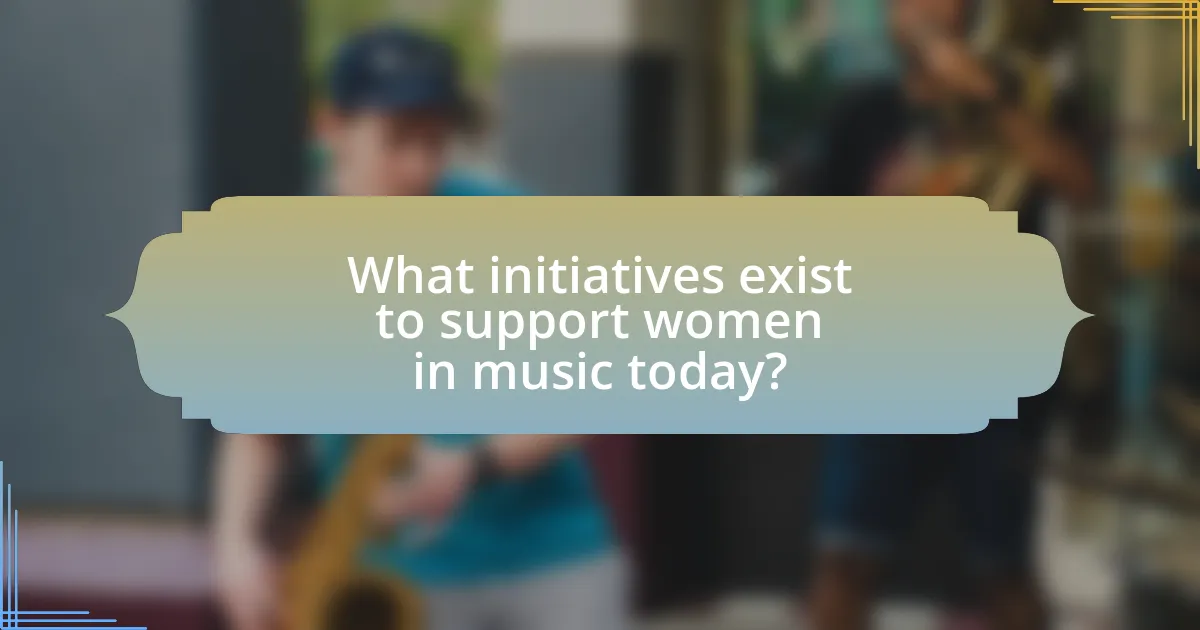
What initiatives exist to support women in music today?
Numerous initiatives exist to support women in music today, including organizations like Women in Music, which advocates for gender equality and provides networking opportunities. Additionally, the She Is The Music initiative focuses on increasing the number of women in music roles through education, mentorship, and resources. Furthermore, the Recording Academy’s Advocacy and Inclusion initiatives aim to promote diversity and support women in the industry. These organizations collectively contribute to a more equitable music landscape by offering resources, mentorship, and advocacy for women musicians and industry professionals.
How do organizations promote women’s contributions to music?
Organizations promote women’s contributions to music through initiatives such as mentorship programs, grants, and dedicated awards. For instance, organizations like the Women’s Audio Mission provide training and resources specifically for women in audio engineering and production, thereby increasing their visibility and participation in the industry. Additionally, events like the Women in Music Awards celebrate female artists and industry professionals, highlighting their achievements and contributions. Research shows that such recognition not only empowers women but also encourages younger generations to pursue careers in music, as evidenced by the increased enrollment of women in music programs following these initiatives.
What programs are available for aspiring female musicians?
Programs available for aspiring female musicians include initiatives like She Rocks Awards, Girls Who Code in Music, and the Women’s Audio Mission. The She Rocks Awards honors female musicians and industry professionals, providing networking opportunities and recognition. Girls Who Code in Music focuses on empowering young women through technology and music, offering workshops and mentorship. Women’s Audio Mission provides training in audio engineering and production specifically for women, aiming to increase female representation in the music industry. These programs collectively support the development and visibility of female talent in music.
How do mentorship and networking opportunities benefit women in music?
Mentorship and networking opportunities significantly benefit women in music by providing essential support, guidance, and access to industry connections. These opportunities enable women to gain insights from experienced professionals, which can enhance their skills and confidence in a predominantly male-dominated field. For instance, research from the Women’s Audio Mission highlights that women who engage in mentorship programs report increased career advancement and improved job satisfaction. Additionally, networking allows women to build relationships that can lead to collaborations, performances, and visibility in the music industry, ultimately contributing to their success and representation.
What can we do to further celebrate and support women in music?
To further celebrate and support women in music, we can increase visibility and representation of female artists in mainstream media and music festivals. Research shows that women are underrepresented in music festivals, with only 20% of performers being female in 2019, according to a study by the Annenberg Inclusion Initiative. By prioritizing female artists in lineups and promoting their work through dedicated platforms, we can create a more equitable environment. Additionally, providing mentorship programs and funding opportunities specifically for women in music can empower emerging female musicians and producers, fostering a supportive community that encourages their growth and success.
How can individuals contribute to the recognition of women in music?
Individuals can contribute to the recognition of women in music by actively promoting their work and achievements through social media, events, and discussions. By sharing music created by female artists, individuals can increase visibility and appreciation for their contributions. For instance, highlighting the accomplishments of women like Aretha Franklin, who was the first woman inducted into the Rock and Roll Hall of Fame in 1987, can inspire others to acknowledge and celebrate female talent in the industry. Additionally, supporting organizations that advocate for gender equality in music, such as Women in Music, can amplify efforts to recognize and support women artists.
What are some effective ways to promote female artists and their work?
Effective ways to promote female artists and their work include leveraging social media platforms, organizing dedicated events, and collaborating with established artists. Social media platforms like Instagram and TikTok allow female artists to showcase their work directly to audiences, increasing visibility and engagement. Events such as women-focused music festivals and showcases provide a platform for female artists to perform and connect with fans and industry professionals. Collaborations with established artists can enhance credibility and reach, as seen in partnerships like those between Billie Eilish and established musicians, which have significantly boosted her profile. These strategies are supported by data indicating that female artists who actively engage on social media and participate in collaborative projects experience higher levels of audience growth and recognition.
